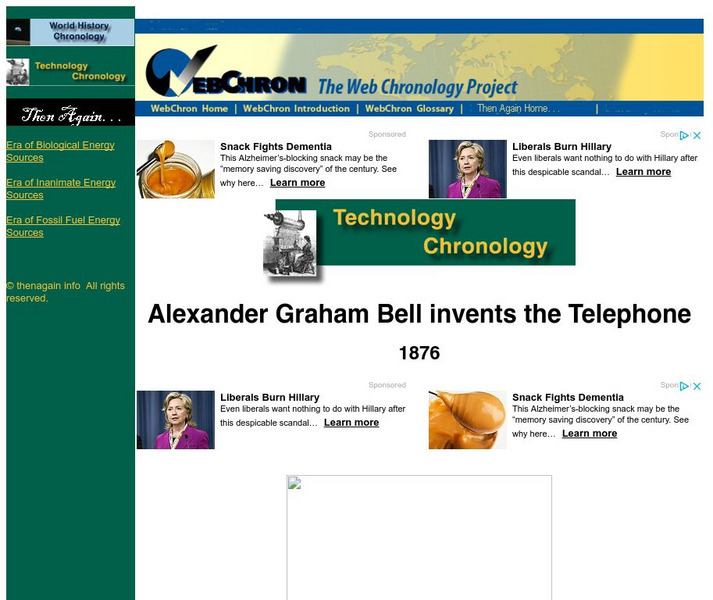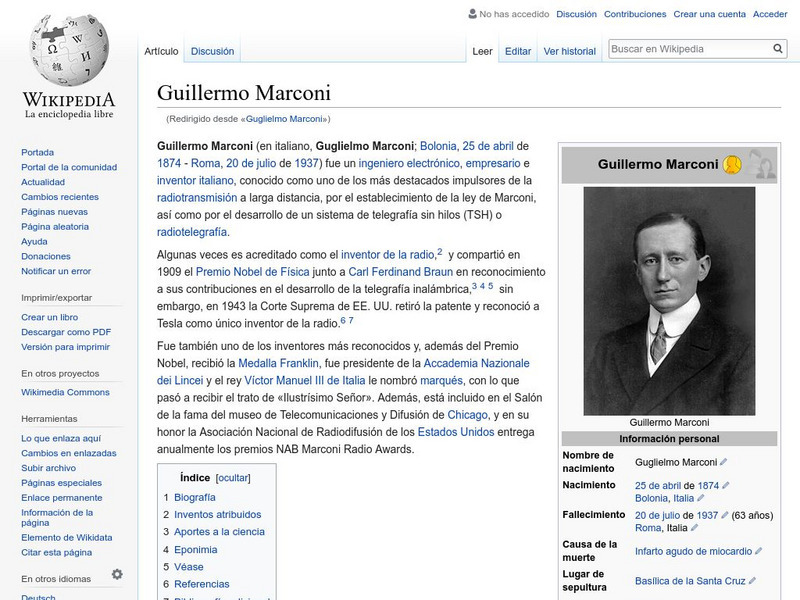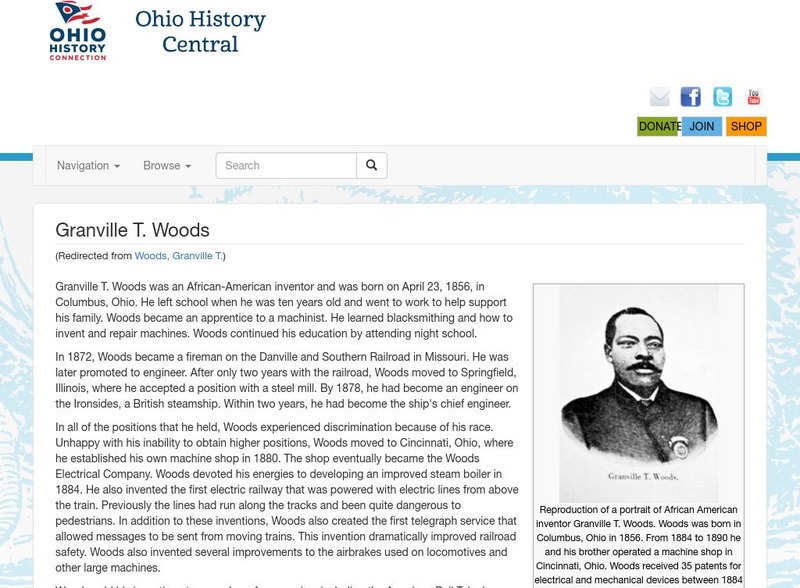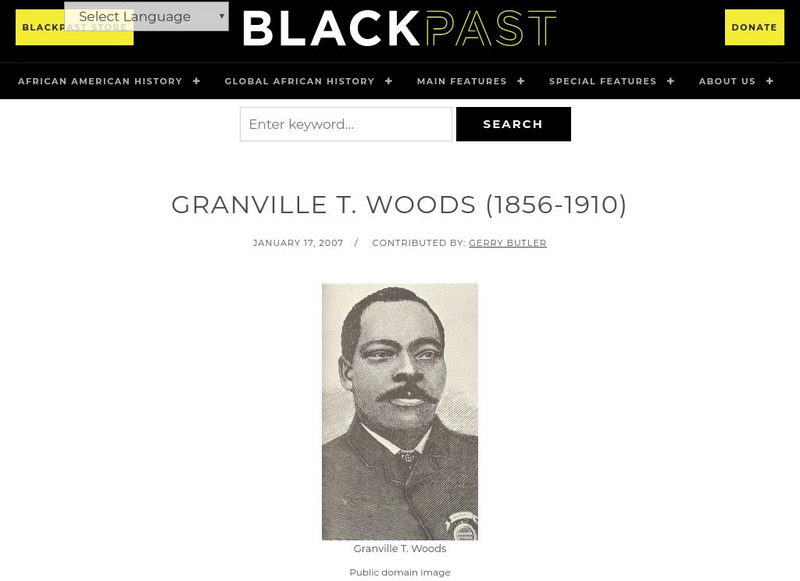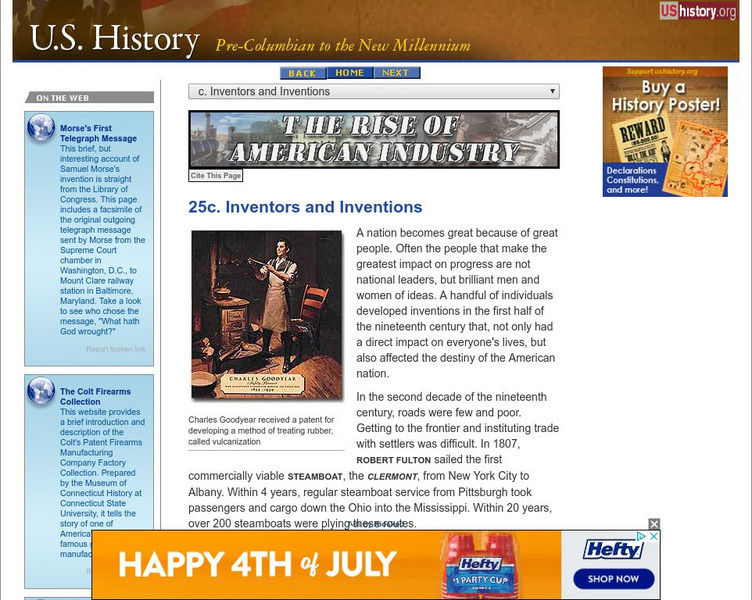Civil War Home
Home of the American Civil War: Military Telegraph Service
Ciphers, codes, and wiretaps were all part of the telegraph service in both the Union and Confederacy. Read about the importance of the telegraph in relaying information and obtaining plans surreptitiously. From "Photographic History of...
Digital History
Digital History: Roots of American Economic Growth: Speeding Communications
Find out the many reasons why communication speed increased in the early 19th century. It wasn't just because of the telegraph.
National Endowment for the Humanities
Neh: Edsit Ement: Was There an Industrial Revolution?
This lesson plan from EDSITEment discusses the actual factors leading to the Industrial Revolution in the post-civil war era. Contains many links to primary source materials.
Digital History
Digital History: Resistance to Technological Innovation
Hinderances to technological advances included poor education and hostility to innovation and experimentation. See how this opposition was overcome by the many smalltime tinkerers and inventors who ignited people's interest in technology.
Then Again
Then Again: Web Chron: Alexander Graham Bell Invents the Telephone
This site describes how Bell started out by seeking to help the deaf and ended up with a telephone. It gives brief information about his family and how he came to invent the telephone.
Open Door Team
Open Door Web Site: The Second Industrial Revolution
An overview of the achievements that occurred during the second Industrial Revolution are found on this site. It includes information on gas and electric power, communications, public transportation, the motor and flight industries, and...
Wikimedia
Wikipedia: Guillermo Marconi
This site chronicles the father of wireless communication. Examines his life and how his accomplishments affected both society and warfare.
Smithsonian Institution
National Museum of American History: Edison After Forty
This online exhibition traces Edison's life, both personal and professional after he reached forty. Historic, primary materials are included.
Smithsonian Institution
National Museum of American History: Information Age
This exhibition surveys the history of information technology and its relation to society from the origin of the telegraph to the present. Its emphasis is as much on social as technical change. This support page contains background...
The History Cat
The History Cat: Lincoln's High Tech War
Describes the weaponry used during the Civil War, and some of the innovative technology that the Union's military forces employed. These included the minie ball, rifles, underwater torpedoes, the use of hot air balloons, and improved...
National High Magnetic Field Laboratory
Magnet Academy: Mirror Galvanometer
Invented by William Thomson (who later became Lord Kelvin for such clever acts as this), the mirror galvanometer was a useful instrument that played a key role in the history of the telegraph. (Java tutorial)
National High Magnetic Field Laboratory
Magnet Academy: Morse Telegraph 1844
The man most commonly associated with the telegraph, Samuel Morse, did not invent the communications tool. But he developed it, commercialized it and invented the famous code for it that bears his name.
National High Magnetic Field Laboratory
Magnet Academy: Transatlantic Telegraph Cable 1858
The main figure behind the first transatlantic telegraph knew very little about the science or engineering behind it, but was convinced that with it a fortune could be made. Read about these findings here.
National High Magnetic Field Laboratory
Magnet Academy: Timeline of Electricity and Magnetism: 1840 1849
The legendary Faraday forges on with his prolific research and the telegraph reaches a milestone when a message is sent between Washington, DC, and Baltimore, MD.
Ohio History Central
Ohio History Central: Granville T. Woods
A biography of Granville T. Woods, who used his knowledge of machinery to establish his own company and invent many different improvements for the railroad.
Library of Congress
Loc: The Invention of the Telegraph
This site chronicles the invention of the telegraph by Samuel Morse (1791-1872 CE).
Smithsonian Institution
Smithsonian Institution Forgotten History: Alfred Vail and Samuel Morse
This article explains Alfred Vail's partnership with Samuel Morse and his contributions to the development of the telegraph.
Other
The Telegraph: Calcutta
The Telegraph is Calcutta, India's local/regional/national news source online.
Maryland Science Center
Maryland Science Center: Diy Telegraph [Pdf]
Instructions for how to build a telegraph device for sending a message in Morse code.
Other
Upper Canada Village
Ever want to know what life in Canada was like back in the 1860's? Well, look no further than this site! Information can be found on topics such as: daily life, communication, manufacturing, religion and more. Also be sure to check out...
Black Past
Black Past: Woods, Granville T.
A fascinating encyclopedia article about Granville Woods, a black inventor,often referred to as the "black Edison."
Independence Hall Association
U.s. History: Inventors and Inventions
The industrial revolution in America spawned the inventions of many inventors, who improved technology in many different areas. See how transportation, agriculture, and communications were transformed because of these inventions.
CK-12 Foundation
Ck 12: Physics Simulation: Telegraph
[Free Registration/Login Required] Explore the concept of Morse Code and how signals are transferred over great distances by using telegraph machines based on electromagnets using our interactive simulation. A PDF worksheet and a video...






